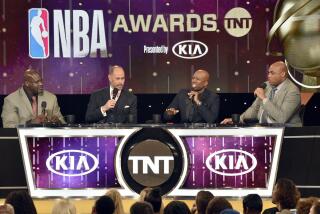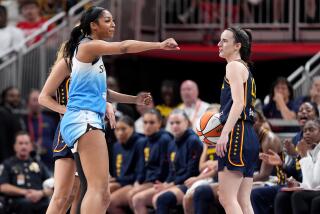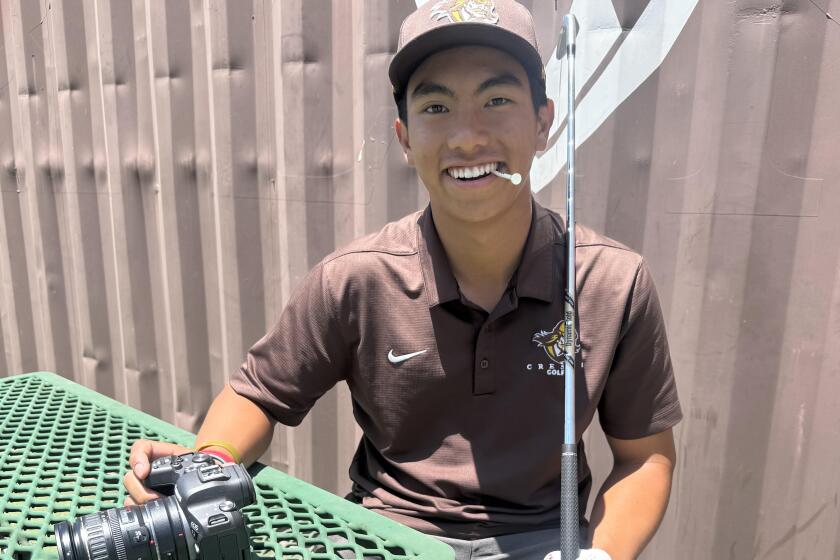It’s Time for League to Set Some New Ground Rules
- Share via
CHICAGO — It finally happened.
You wondered when all of the hard fouls against Shaquille O’Neal would add up to something more than bonus free throws.
They can be seen and heard almost every time he gets the ball, those flailing arms and the smack of skin-on-skin. Usually O’Neal responds only by glaring at the referee, and maybe calling out “And one!” if the shot goes in.
It came to a head Saturday night--actually, it came at Chicago center Brad Miller’s head--in the form of an O’Neal fist.
One extra-hard hack too many, this time from Miller with help from Charles Oakley
Less than three minutes left until the Lakers could finish this five-game road trip and head for home. Only the Bulls were making this an unexpected fight, and O’Neal was suffering through a horrible five-for-14 shooting night. He got the ball in the lane, Miller arms came down on him, followed by Oakley’s.
As Miller stumbled in the direction of the Bulls’ bench, O’Neal came after him, like Marvin Hagler chasing Thomas Hearns around the ring.
Fortunately, O’Neal’s punch was about as accurate as one of his free throws. It missed, or else we might be writing an obituary today and O’Neal would be sitting out for the next year.
But O’Neal kept after Miller, while Oakley and Ron Artest came flying in with tackles that as well executed as anything in the NFL playoffs and they all landed in a heap in the baseline by the Bulls’ bench, with referees and players and security guards trying to break them up.
The final tally will include several missed games and hundreds of thousands of dollars in lost salary, once NBA Vice President of Operations Stu Jackson hands down the final verdict.
What Jackson and Ed T. Rush, the league’s supervisor of officials, need to do next is decide once and for all how they’re going to handle O’Neal and the punishment he absorbs and administers.
Special rules? They already exist for him.
NBA officials have negotiated an unspoken exchange: they let O’Neal bull his way through opponents on offense and they let defenders audition for the WWF against him. Just about every time O’Neal touches the ball, somebody gets fouled.
“We really can’t get into the judgment of it all,” said Dan Crawford, the lead official of Saturday night’s three-man crew. “Very difficult man to referee, though. I can tell you that.”
Then his superiors should spell it out. It’s time to call an end to the stand-off. Get rid of the mugging, and in turn force O’Neal to go to his finesse moves. He has the skills to adjust. If other players can’t adapt to playing basketball like basketball--i.e., play the man, hack only if you’re going after the ball--then they should be weeded out of the league.
Otherwise, deter this stuff by calling these fouls for what they are--level one flagrant fouls--and award the Lakers two shots plus possession whenever people decide to grab, hug or whack Shaq.
The only word the NBA rulebook uses to describe a flagrant foul is “unnecessary.” That leaves a lot of room for interpretation.
Here’s Laker Coach Phil Jackson’s interpretation of how opponents play O’Neal, and I happen to agree.
“Everybody goes after Shaq hard and says foul him really hard,” Jackson said. “In the process of fouling him hard, they get him two or three times from different places. That’s all well, as long as they’re playing the ball. That’s the rule, that you have to be going to block the shot, have to get to the ball but not just whack the guy indiscriminately. They don’t call it [against] Shaq and he gets frustrated. A lot of times he comes in the locker room and he’s frustrated during the course of the game because of that kind of action.”
Laker power forward Samaki Walker is in the paint with O’Neal, seeing and hearing everything that goes on.
“Big Fella takes a beating like this and the league has an idea that he’s so big that he’s supposed to take a lot of the brutality and the punishment that players dish out because of his size,” Walker said. “Well, that’s not what it is. A foul is a foul.”
Part of the problem is O’Neal has so few worthy adversaries. You’ll notice these types of situations didn’t arise when O’Neal went against such players as Hakeem Olajuwon, Patrick Ewing, Alonzo Mourning and Dikembe Mutombo--especially when they were on top of their games.
One of the reasons the 2001 NBA Finals were more compelling than your typical five-game series is because the Philadelphia 76ers played O’Neal without the nonsense, letting Mutombo try to defend him as best as humanly possible.
But when you get teams like the Bulls and players like Miller, you get strategies like this: “You’ve got to foul him,” Miller said. “That’s the only way you guard him, is foul him and hope he misses his free throws. It’s that odds game.”
He also said: “If he was only 6-6, 250, he wouldn’t get hit that way. It’s not our fault that he’s just that much bigger than everybody in the league.”
That’s the justification everybody uses.
“He’s [bleeping] 400 pounds,” Oakley said. “You can’t take a hit, you shouldn’t be playing ball. He’s a big guy, he’s going to get hit. We got hit, we kept playing.”
This wasn’t just about Brad Miller. It was about Oakley ... and Matt Geiger and Greg Ostertag and Malik Rose and all the other players who have grabbed and smacked and held him.
And it was about his own two feet, those sore big toes that keep from dunking even from close range.
The only good thing about the upcoming suspension is it will give O’Neal a chance to rest those toes.
And the break should give NBA officals a chance to re-think their approach. They don’t need an official rule change, because there’s no official rule in place now. They just need to re-evaluate, before O’Neal does more rule enforcements with his fist.
*
J.A. Adande can be reached at: j.a.adande@latimes.com
More to Read
Go beyond the scoreboard
Get the latest on L.A.'s teams in the daily Sports Report newsletter.
You may occasionally receive promotional content from the Los Angeles Times.










